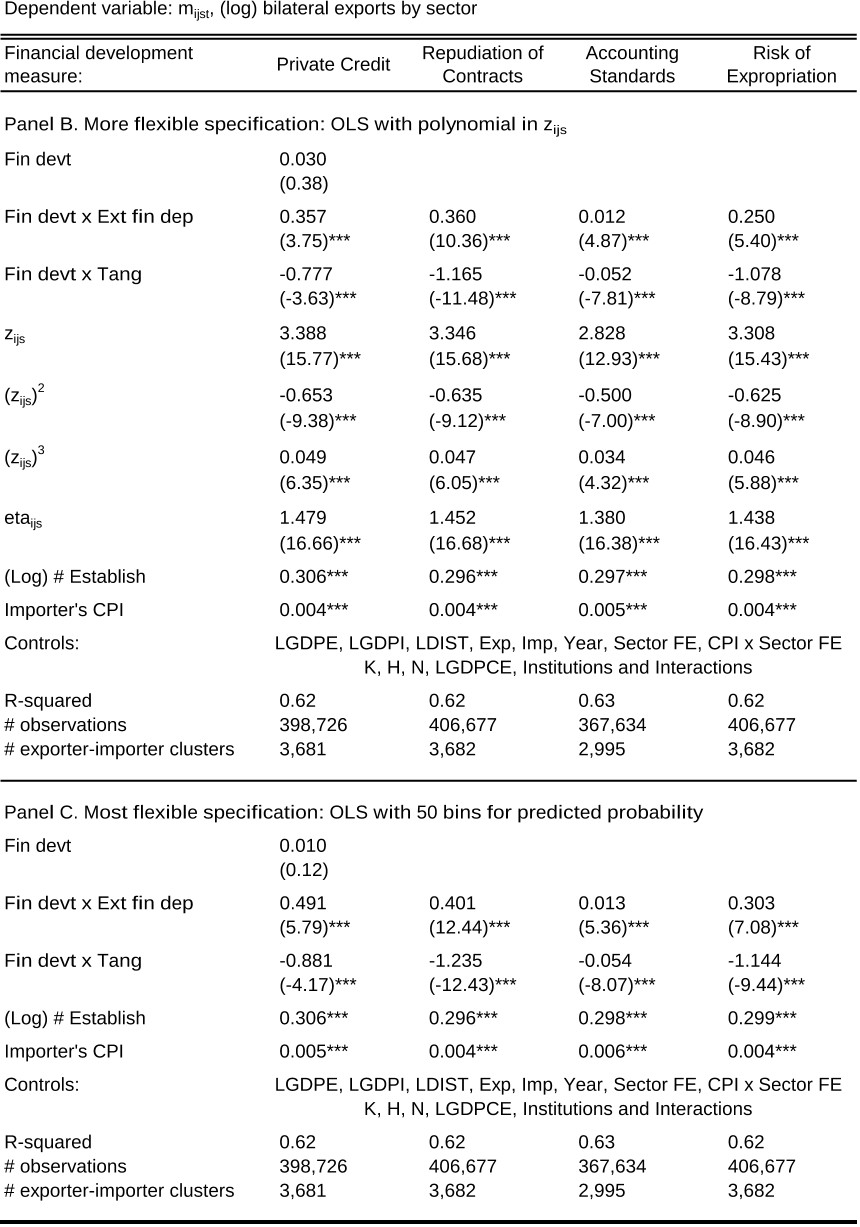Credit Constraints, Heterogeneous Firms and International Trade
Reads0
Chats0
TLDR
This article examined the detrimental consequences of financial market imperfections for international trade and developed a heterogeneous-firm model with countries at different levels of financial development and sectors of varying financial vulnerability.Abstract:
This paper examines the detrimental consequences of financial market imperfections for international trade. I develop a heterogeneous-firm model with countries at different levels of financial development and sectors of varying financial vulnerability. Applying this model to aggregate trade data, I study the mechanisms through which credit constraints operate. First, financial development increases countries' exports above and beyond its impact on overall production. Firm selection into exporting accounts for a third of the trade-specific effect, while two thirds are due to reductions in firm-level exports. Second, financially advanced economies export a wider range of products and their exports experience less product turnover. Finally, while all countries service large destinations, exporters with superior financial institutions have more trading partners and also enter smaller markets. All of these effects are magnified in financially vulnerable sectors. These results have important policy implications for less developed economies that rely on exports for economic growth but suffer from poor financial contractibility.read more
Figures

Table 10. Economic Significance: Predicted vs. Actual Trade Growth 
Table 9. Economic Significance: Comparative Statics 
Table 5. Financial Development and Firm-Level Exports 
Figure 3. The Productivity Cut-off for Exporting 
Table 5. Financial Development and Firm-Level Exports 
Table 1. Export Patterns in the Data
Citations
More filters
Journal ArticleDOI
Trade Finance in Periods of Crisis: What Have We Learned in Recent Years?
Marc Auboin,Martina Engemann +1 more
TL;DR: In this article, the authors review a number of initiatives taken by public and private institutions aimed at minimizing the impact of the on-going crisis of the financial sector on its ability to supply trade finance to support trade at affordable rates.
Journal Article
Corporate Finance and Comparative Advantage
Peter Egger,Christian Keuschnigg +1 more
TL;DR: In this paper, the authors report that comparative advantage is shaped by factor endowments as well as fundamental determinants of corporate finance, and that a larger equity ratio of firms and tough governance standards relax finance constraints and create a comparative advantage in innovative industries.
Journal ArticleDOI
Effects of financial constraints on export performance of firms during the global financial crisis: microeconomic evidence from Korea
TL;DR: In this article, the authors used a manufacturing firm-level panel data set of South Korea for 2006-2013 to investigate the effect of financial constraints on the export performance of firms.
Journal ArticleDOI
Macroeconomic adjustment under loose financing conditions in the construction sector
TL;DR: In this article, the authors provide a model with sector-specific debt-collateral constraints to analyze how asymmetric financing conditions across sectors affect the aggregate investment, credit and output composition.
Journal ArticleDOI
Contracting Institutions, Agro‐food Trade and Product Quality
TL;DR: This paper showed that countries with better contract enforcement specialise in the production of food which requires higher level of relationship-specific investments and also find that countries that have better contracting institutions and producing contract-intensive goods specialize in exporting high quality foods.
References
More filters
Posted Content
Law and Finance
Rafael La Porta,Rafael La Porta,Florencio Lopez de Silanes,Florencio Lopez de Silanes,Andrei Shleifer,Andrei Shleifer,Robert W. Vishny,Robert W. Vishny +7 more
TL;DR: This paper examined legal rules covering protection of corporate shareholders and creditors, the origin of these rules, and the quality of their enforcement in 49 countries and found that common law countries generally have the best, and French civil law countries the worst, legal protections of investors.
Journal ArticleDOI
Law and Finance
TL;DR: In this article, the authors examined legal rules covering protection of corporate shareholders and creditors, the origin of these rules, and the quality of their enforcement in 49 countries and found that common-law countries generally have the strongest, and French civil law countries the weakest, legal protections of investors, with German- and Scandinavian-civil law countries located in the middle.
Journal ArticleDOI
The Impact of Trade on Intra-Industry Reallocations and Aggregate Industry Productivity
TL;DR: This paper developed a dynamic industry model with heterogeneous firms to analyze the intra-industry effects of international trade and showed how the exposure to trade will induce only the more productive firms to enter the export market (while some less productive firms continue to produce only for the domestic market).
Journal ArticleDOI
Finance and Growth: Schumpeter Might Be Right
TL;DR: In this paper, the authors examined a cross-section of about 80 countries for the period 1960-89 and found that various measures of financial development are strongly associated with both current and later rates of economic growth.
ReportDOI
Financial Dependence and Growth
Raghuram G. Rajan,Raghuram G. Rajan,Raghuram G. Rajan,Luigi Zingales,Luigi Zingales,Luigi Zingales +5 more
TL;DR: This paper examined whether financial development facilitates economic growth by scrutinizing one rationale for such a relationship; that financial development reduces the costs of external finance to firms, and found that industrial sectors that are relatively more in need of foreign finance develop disproportionately faster in countries with more developed financial markets.